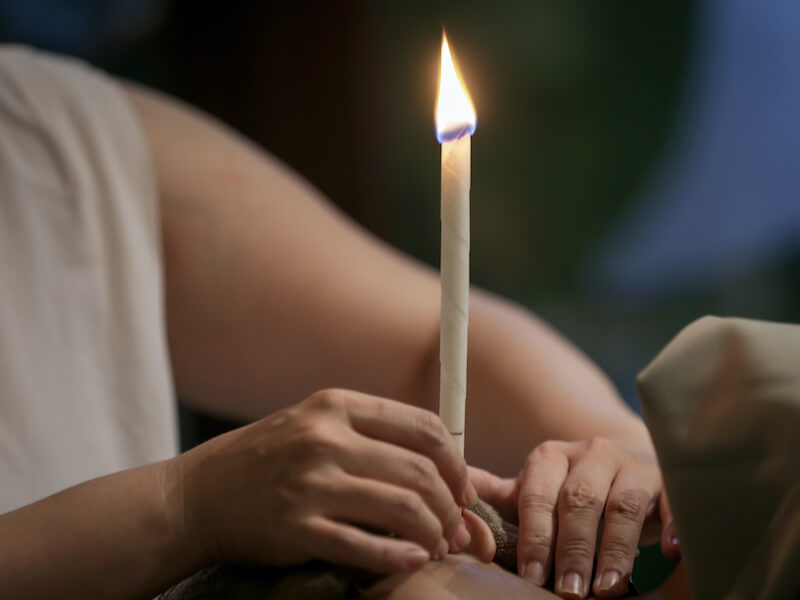
Everybody loves an easy fix, especially when the solution is also a DIY fix. Sink Leaking? You can learn about how to fix that from a YouTube video. A plumber would most likely be a bit more efficient but then you wouldn’t get that feeling of self-satisfaction that comes with doing it on your own.
But that feeling only continues until your sink begins to leak again. Because, as it turns out, in some cases a DIY fix is no replacement for the well-honed skills of a professional.
It’s not always easy to acknowledge that this is the situation. And, in part, that’s why individuals will frequently continue to look for “easy” DIY-fixes for intricate problems, which might help explain the popularity of something called ear candling (or, in some cases, earwax candling). It doesn’t really sound very appealing, does it? Let’s dive into exactly what earwax candling is and its dangers.
Ear candling – what is it?
Have you ever had a plugged-ear kind of feeling? Sometimes, your ear will fill with mucus when you’re sick. Too much earwax can also trigger this feeling and that can happen for a number of reasons. When this takes place, you might experience a certain amount of discomfort. You may even experience a temporary loss of hearing. It kind of stinks!
Some individuals, as a result, think that ear candling is just the cheap and novel fix they need. The concept is that a special hollow candle is put into your ear (non-burning end). Somehow, the blend of heat and the hollow style of the candle alters the air pressure within your ear canal, drawing the earwax or mucus out.
Healthcare professionals absolutely don’t suggest this approach. Do ear candles actually draw wax out? No. There’s absolutely no evidence that ear candling is effective (particularly not in the way that it’s supposed to work). Essentially, most hearing and healthcare professionals will strongly advise against ever using this technique. (Does ear candling help with sinus pressure? Also no.)
The FDA also firmly advises against this practice.
What are the drawbacks of ear candling?
Ear candling may feel safe, at first. It’s just a tiny flame. And you’re using “specialized” equipment. And individuals on the internet said it was safe! So how could it be possible for ear candling to be harmful?
Unfortunately, there’s no getting around the fact that ear candling can be downright hazardous. What are the side effects of ear candling? Here are just some of the (possibly painful) ways that ear candling can affect your health:
- You can cause severe burns to your ear: The fire and the melting ear candle wax are really hot. Your ear is very sensitive and significant burning can take place if the flame or the hot wax gets somewhere it shouldn’t.
- Your ear can have surplus candle wax left behind: The candle wax can get into your ears even if you don’t get burned. Your hearing can become impacted from this, not to mention the discomfort.
- You may accidentally puncture your eardrum: Whenever you put something into your ear, you put yourself at risk! Your hearing will suffer substantial harm and discomfort if you end up puncturing your eardrum. If this occurs it’s very likely that you will need to get professional assistance.
- The earwax can be crammed even further into your ear: Putting an ear candle inside your ear can actually force earwax further into the ear canal much like when you use a cotton swab. Your earwax problem can be worsened by earwax candling, in other words! This can cause all sorts of other complications from hearing loss to serious infections.
- You could seriously burn your face: Look, any time you’re positioning candles that close to your face, there’s a good possibility you’ll get a burn. Everybody has accidents now and then. Serious burns on the face are not the only hazards, you could also catch your hair on fire or trickle hot wax into your eye.
So, is ear candling endorsed by hearing healthcare professionals? Not at all! Not only is ear candling not helpful, it’s actually really dangerous!
A better way to Tackle earwax
Ear wax is generally rather healthy. In normal amounts, it’s good for your ears. It’s only when there’s an excessive amount of earwax (or it isn’t draining well) that you start to have issues. So… if you can’t make use of a burning candle to remove earwax, what should you do?
If you have an earwax obstruction, the best thing to do may be talking to a hearing specialist. Usually, they will recommend that you try some at-home solutions, such as a saline wash, to soften the wax allowing it to drip out on its own. But in some instances, they will perform a cleaning for you.
Hearing specialists have specific tools and training that allow them to clean out wax without damaging your ear.
In general, you should avoid techniques like utilizing cotton swabs and earwax candling. Unless your hearing specialist says differently, it’s a good plan to never put anything smaller than your finger in your ear.
Give your ears some relief
If accumulated earwax is causing you a little discomfort or distress, you should schedule an appointment with us. We will be able to help you remove any stubborn earwax out of your ears and get you back to feeling normal.
References
https://www.fda.gov/consumers/health-fraud-scams/ear-candling-ineffective-and-risky